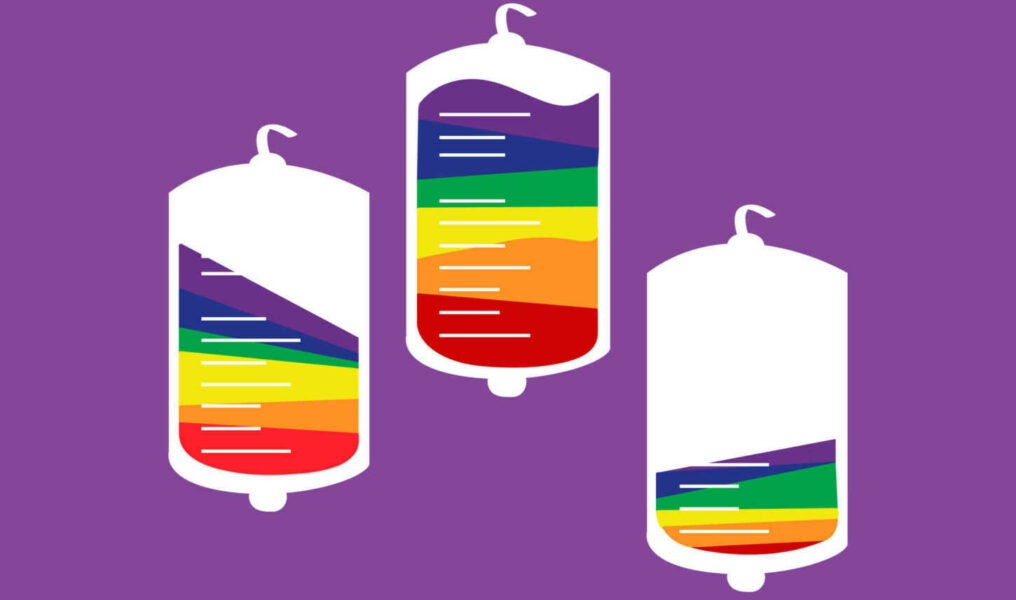FDA Proposes New Individual Risk Assessments to Make It Easier For Gay, Bisexual Men To Donate Blood

A new FDA policy will pave the way for more gay and bisexual men to donate blood. Current policy requires MSM (men who have sex with men) to undergo a three-month period of abstinence before donating. But the FDA says it is now proposing to change from “time-based deferrals” to “gender-inclusive, individual risk-based questions” to reduce the risk of transfusion-transmitted HIV.
FDA Commissioner Dr. Robert M. Califf said in a statement that “maintaining a safe and adequate supply of blood and blood products in the U.S. is paramount for the FDA, and this proposal for an individual risk assessment, regardless of gender or sexual orientation, will enable us to continue using the best science to do so.”
The proposed new policy would put the U.S. in line with policies in place in Canada and the United Kingdom. The policy switch, say local experts, is long overdue. Stamatina E. Ziemba, Ph.D. is a microbiologist and medical lab scientist who has both worked for the Beaumont Health Care System and taught at Wayne State University. Ziemba said the current policy in place is “ridiculous.”
“We have increased our knowledge and ability to detect HIV in donated blood greatly,” she said, adding that “chances are much higher that, when HIV is detected in a blood donation, the donor was a sexually active, with multiple partners, heterosexual male who isn’t even getting tested for HIV.”
Dr. Paul Benson has been treating MSMs for decades at his Be Well Medical Center in Berkley. He said that “with the blood supply always being in limited supply, we can do better in determining risk of communicable diseases, including HIV in donors.”
Benson pointed out in a previous Pride Source story that not all gay men are at risk for HIV.
“Some take PrEP, some are not sexually active, and some are in monogamous HIV-negative relationships,” he said. “This puts these groups of individuals at no risk or less risk than others.”
Ziemba agreed.
“Most gay men I know get tested regularly if not in a committed relationship and take PrEP,” she said. “So, in my opinion, the FDA changing their blood donation policy for gay men is long overdue.”
Under the proposed new guidance, time-based deferrals will be eliminated, the current donor questionnaire will be revised to ask all prospective donors about new or multiple sex partners in the past three months, prospective donors who report having a new sexual partner or more than one sexual partner and who have had anal sex in the past three months would still be deferred from donation and, finally, prospective donors who do not report having new or multiple sexual partners or anal sex in the past three months, may be eligible to donate, provided all other eligibility criteria are met.”
Despite the fact that it has been proven that those who are HIV-positive but with an undetectable viral load cannot transmit HIV, those who have ever tested positive for HIV are permanently restricted from donating blood. In addition, you cannot donate blood if you are currently taking PrEP and must wait until three months after your last oral dose or two years after your last injection before donating. This is because in donors with a breakthrough infection, PrEP can cause the level of HIV in the blood to drop to a level that cannot be detected when a donor is screened for HIV.
“This is simply a matter of following the data that we have at this time, which is that we know that people who take PrEP — at least, at this point with our knowledge of PrEP — that if you look at the population overall taking PrEP, there’s a certain risk currently of contracting HIV,” said Dr. Peter Marks, director of the FDA’s Center for Biologics Evaluation and Research. “So until we can better sort out who is of lower risk in that group taking PrEP, we need to put this donor deferral in place for PrEP.”
The proposed new guidance will be officially put in place after a period of public comment.










